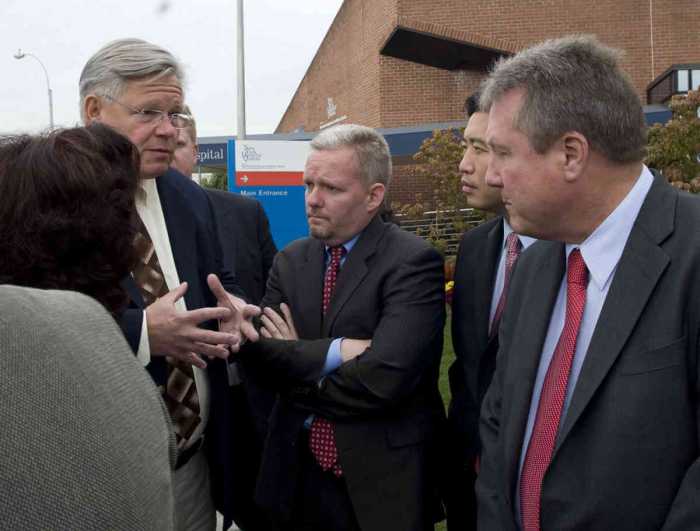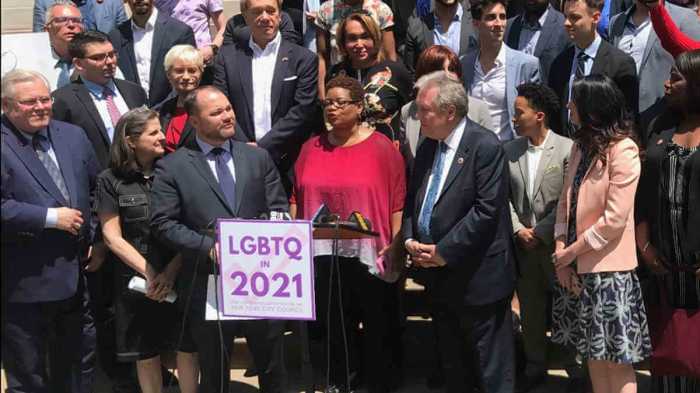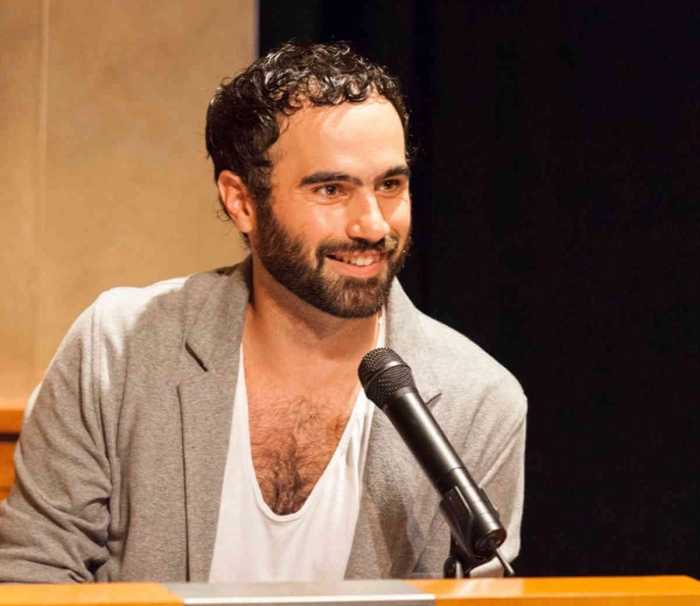BY PAUL SCHINDLER | Reaction to the Empire State Pride Agenda’s stunning December 12 announcement that it was folding up its tent is comparable to the way people talk about the weather. Everybody complained about it, but the big question is what can be done about it.
A number of people who have spoken to Gay City News — including past ESPA senior staff and board members — are now exploring specific steps to fill the gaping political void resulting from the group’s departure. Based on nearly a dozen and a half conversations with community leaders and elected officials, it’s clear it’s too early to predict what shape any successor organization or coalition to advance LGBT interests in New York might take, but most respondents agreed on basic requirements any effort would have to meet to achieve credibility and broad support.
Diversity, in every respect, was the most common theme emphasized. A new organization, everybody seemed to agree, would only have legitimacy by representing lesbian, gay, bisexual, and transgender New Yorkers, regardless of race, ethnicity, age, income, and geography. The requirement that a younger generation step up to lead was frequently mentioned, and there is no doubt that credibility on issues of concern to the transgender community will be a critical factor in judging the success of any post-ESPA organization.
At the same time, it also seems inevitable that transgender advocates will step up efforts to create their own political organizations to supplement and put pressure on any broader-based effort that emerges.
Related to the issue of diversity, in the comments of many, was the question of vision, a point on which many critics faulted the Pride Agenda in its work since marriage equality was achieved four years ago. Over and over again, those who spoke to Gay City News emphasized that equality was only one half of a mission that also included justice — whether economic, social, in health access and outcomes, or in the criminal justice system.
Finally, many of those who spoke to Gay City News are clearly wrestling with the challenge of how to balance the interests and influence of everyone from donors, whose money is needed to carry out work on a large scale statewide, to the grassroots, many of whom feel outside of the process, especially when they are unable to afford a ticket to some of the largest events put on by big budget LGBT groups.
Still, there is no precise roadmap going forward. In fact, in the view of several influential former ESPA leaders, the best path forward would for the group to reverse its December 12 decision. Four past top leaders of the group, who convened on December 14, offered the quickest response to the Pride Agenda’s decision. The group included Dick Dadey, who was the founding executive director from 1991 through 1997; Matt Foreman, who led the group for nearly five years in two stints between late 1997 and mid-2003 and oversaw passage of the state hate crimes and gay rights laws; Alan Van Capelle, who succeeded Foreman and achieved victory on marriage equality in the State Assembly before being turned back in the first State Senate vote in late 2009; and Joe Tarver, a top lieutenant to both Foreman and Van Capelle, who briefly served as interim executive director when Van Capelle departed in early 2010.
The conclusion the four came to — that the Pride Agenda must rethink its decision — is not surprising given the reaction each had to the announcement, which none of them was given advance word of. A statement Gay City News received from ESPA on December 23, however, appears to rule that option out.
Foreman, who now heads up philanthropic giving in LGBT and immigrant rights for the Evelyn & Walter Haas, Jr. Fund, said ESPA’s apparent failure to reach out to anyone beyond its own board members and senior staff “is an abrogation of a fundamental obligation that an organization has to its constituency… There was zero consultation with folks who spent their lives building the Pride Agenda. If they are going to make a decision of that magnitude, there has to be a consultative function.”
Dadey, who is executive director of Citizens Union, a New York non-profit good government group, echoed Foreman’s perspective. “I greeted that letter with complete shock and disappointment,” he told Gay City News. “They were shutting down the organization that so many of us helped build into such a strong brand. You don’t do that without talking to some of the stakeholders who played that role.”
According to Foreman, “Millions of dollars were spent on building up this brand, and now they are just throwing it away.”
Foreman, who now lives in California, said that New York, compared to that state, has a “statutory framework that is still dismissive and silent on many needs” of the LGBT community. California has dozens of pieces of LGBT-specific laws, he said, that address questions of “lived equality.” Legislation passed there, Foreman said, is “baking in equality.”
“We are dealing with a political system, and you need a political organization,” Foreman said. “Albany doesn’t just respond to good ideas.”
“The issues and the needs have changed, it doesn’t mean there is not a need,” was how Dadey explained his view that ESPA should carry on. “You cannot predict the future challenges that an issue like equality for the LGBT community will face. We need to make the political victories part of the fabric of our society.”
Van Capelle, now CEO of the Lower East Side-based Educational Alliance, also emphasized the need for a statewide political voice and alluded to the crisis time when a relatively unorganized gay community first faced AIDS. “I think it’s critically important that LGBT New Yorkers remain politically active as LGBT New Yorkers,” he said, adding, “I don’t want it to take us a decade to reinvent the wheel when the next crisis comes up.”
Both Dadey and Foreman, in their comments, made clear that if the Pride Agenda were to reverse course and try to stay alive, it would have to articulate a vision clear and compelling enough to win both donor and grassroots support. “They did not have the vision to see a path forward,” Dadey said. “So they took the easy way out.” Foreman said, “To the extent that maybe the donor base wasn't aware of the rest of the agenda, that’s Pride Agenda’s fault.”
And both men challenged ESPA’s notion that simply keeping alive its political action committee — whose annual expenditures have in recent years been measured only in the tens of thousands of dollars — represented any meaningful continuation of its important legacy. “What has moved Albany has been community pressure,” he said. “Making donations is not the same as having a detailed policy agenda.”
Dadey said that after the four former ESPA leaders caucused, they presented their recommendation — that the group try to forge “a smaller, leaner, more focused Pride Agenda beyond just a PAC” — to current board leaders. “They heard us. They respected our point of view,” he said, before adding, “I think the Pride Agenda has a very small window for stepping back into this conversation.”
The board leaders at ESPA appear ready to let that window close.
“Pride Agenda Board leaders last week had constructive conversations with some former Executive Directors and others about the work that lies ahead for our community,” Norman C. Simon, chair of the Pride Agenda and co-chair of its affiliated educational Foundation, wrote in a December 23 email to Gay City News. “Our discussions were fully consistent with our Boards’ already-announced commitment to engage LGBT partner organizations about our transition of remaining programmatic work, and to explore how our PAC may serve as a means of having a continuing voice in electoral politics… The Boards stand by and are not reversing their unanimous decision that the Empire State Pride Agenda Foundation, Inc. and the Empire State Pride Agenda Inc. will wind down major operations in 2016.”
Asked a day before Simon sent that statement how he would move forward should the group decline his recommendation, Dadey said, “I am always interested in discussing the future of the LGBT community.”
Simon’s doubling down on the group’s decision to close up shop will be unwelcome news to Libby Post, a co-founder of ESPA in 1990 and board member for three years after that. Like Foreman and Dadey, she complained about being given “no clue” as to what was afoot. When she sent the group $500 after attending the October dinner in Manhattan, Post, who runs both the New York Animal Protection Federation and Communications Services in Albany, received a thank-you letter assuring her of ESPA’s commitment to continue the fight. After the December 12 announcement, she called Simon and Nathan Schaefer, ESPA’s executive director, to complain about their assertion they had accomplished “the Pride Agenda’s top remaining policy priority.” Post was told, she said, “that it’s all about the money” — a direct contradiction of what the two have said publically.
Post worries about who will defend the annual legislative appropriations for the LGBT Health and Human Services Network, which in each of recent years have provided just under $5 million for more than 50 non-profit service groups statewide. She also noted that with Hillary Clinton likely to be on the ballot in 2016, a record turnout in New York could well flip the State Senate to the Democrats, opening up the chance to move on long-stalled LGBT initiatives like the Gender Expression Non-Discrimination Act (GENDA) and a ban on so-call “conversion therapy” on minors. “And they’re not there?,” she said of ESPA. “That’s insane.”
Stuart Appelbaum, an ESPA board member since 2008, told Gay City News that he has been in conversations with other community leaders about “a new model for expressing the political voice of the LGBTQ community.” In the view of Appelbaum, who is the president of the Retail, Wholesale and Department Store Union, said, “There has to be credibility to that voice which comes from who is represented as opposed to coming from well-meaning donors.”
He explained, “We are looking for a movement model, not a corporate model. Look at what the Pride Agenda did. It spoke only for the board and was not accountable to anyone else or to the community. The board members are not necessarily people engaged on the issues. They could get resources, but that does not make them qualified to make decisions.”
The type of model he has in mind, Appelbaum said, is the Conference of Presidents of Major Jewish American Organizations, which has a small staff but, given that its constituent members include most leading Jewish organizations, it is the nation’s “most powerful Jewish voice because it has the credibility of who they speak for.”
Frank Selvaggi, an entertainment industry business manager who headed up the Pride Agenda board during the battle for marriage equality, is also unhappy with ESPA’s decision. He told Gay City News, “I am committed to making sure the LGBT community has a voice in Albany and everywhere where it needs one in New York State.”
Juli Grey-Owens, a former board member of six years, is now focused on advancing the political voice of the transgender community going forward. The executive director of the Long Island Transgender Advocacy Coalition (LITAC), she was part of a group of advocates that pressed Governor Andrew Cuomo, in the wake of his October announcement of new State Human Rights Division regulations protecting the transgender community, to make GENDA a priority in 2016. Grey-Owens said she wondered what was going on with ESPA when staff members there told her at that time that “the regs were it, and the group would not keep pushing on GENDA” — something the Pride Agenda was not yet saying publically.
LITAC, Grey-Owens said, will be formalizing its structure by seeking 501c3 status from the IRS, allowing its donors to deduct donations on their tax returns. She is also involved in an effort to forge a new statewide political group, Trans Act, drawing on and amplifying the efforts of existing groups and activists. She specifically mentioned conversations she’s had with Kiara St. James, a transgender activist in New York City credited with helping push the issue of transgender women’s access to city shelters. She said LITAC has received $15,000 in funding to hold five community forums, as yet unscheduled, statewide.
Grey-Owens welcomed the opportunity to work with a broader LGBT effort should one emerge, but said, “I think it’s very important for a trans-driven group to be part of the discussion. It’s obvious.”
Michael Silverman, executive director of the Transgender Legal Defense and Education Fund, noting that “there’s still an enormous amount of work to do,” said, “It’s important that all stakeholders come together to figure out what steps we can take to continue moving forward for the trans community. When I talk about stakeholders, I am talking about upstate and downstate, people of color, trans men and women, a diversity of ages and of income.”
Carl Siciliano, the founder of the Ali Forney Center, which provides housing and services to homeless LGBT youth across the city, saying he was “ very sad to see the Pride Agenda go,” argued, “I think there is a pressing need for an inside political voice that can has political muscle and can put pressure on Albany on behalf of the LGBT community. For advocacy, you want people on the inside and on the outside. Having the Pride Agenda on the inside, I could be more critical in my statements.”
Joking that one of his reactions upon hearing the news was, “Shit, I’m going to have to spend more time in Albany,” Siciliano said the burden of picking up ESPA’s slack would fall hardest on smaller upstate advocacy and service groups.
From the standpoint of legislative advocates for the community, the role ESPA played was also critical. “I definitely think a phoenix needs to rise from the ashes,” said out gay State Senator Brad Hoylman, who is the lead sponsor on the bill to outlaw “conversion therapy” on minors and on a measure to end the ban on gestational therapy. “Advocacy matters.”
Hoylman also told Gay City News, “It’s very, very important to have a group to engage the wider public. The Senate minority is starved of resources to promote an LGBT agenda statewide.”
Hoylman’s Democratic colleague Daniel Squadron, who represents Lower Manhattan and portions of Brooklyn and is the lead sponsor on GENDA, said the group’s decision “makes me concerned about advocacy on the many outstanding critical LGBT issues moving forward,” mentioning specifically that bill, Hoylman’s “conversion therapy” measure, and statewide social service spending.



































